Defensemen - Slight Advantage Three Rivers
Doug Harvey - Guy Lapointe
Harvey Pulford (A) - Lester Patrick (C)
Mike Grant - Jack Marshall
Si Griffis
vs
Mark Howe - Earl Seibert (A)
Ryan Suter - Brent Burns
Doug Mohns - Bob Goldham
Sandis Ozolinsh
I have this as a clean sweep for Three Rivers across 3 pairings.
With that being said, the gap between our 2nd and 3rd pairings is small so I ultimately settled on this being a slight advantage for the Pittsburgh based franchise.
1st Pairing - Harvey-Lapointe vs Howe-Seibert - Slight Advantage Three Rivers
I don't need to expand much on Harvey's counting stats, or awards. That's well documented and I think most people rank Harvey as a top 10ish player all time.
What I'd like to highlight are peer reviews of Harvey. Not only quotes by teammates, but opponents, coaches, referees, writers, etc.
If ever there was a near letter perfect hockey player, Doug Harvey might just be that guy. I'm actually blown away by how many direct quotes there are speaking to the level of control Harvey exerted over a game. The calmness at which he played. The rarity of mistakes, being out of position, or being beat 1 on 1. And the sheer volume of people who placed him as the greatest defensemen ever, some putting him above even Orr.
We talk a lot about numbers and hardware, but contemporary praise is another beast all together and Harvey has absolutely no shortage of admirers.
This is the playoff scoring study overpass did, which includes the first wave of peer quotes seen below
Doug Harvey's playoff scoring compared to his regular season scoring is consistent with a player who could play at a high level offensively, but only did so when his team needed it. During the 1956-1960 Montreal dynasty, Doug Harvey scored at a notably higher level in the playoffs than in the...

forums.hfboards.com
Red Storey, longtime NHL referee:
I have been involved in hockey for thirty years and with all sincerity, I must admit that Doug Harvey is the greatest defense player in the history of our national sport. I have seen Harvey play since he lined up with the Royal juniors, and I have always followed with interest his rise in hockey. He's a real general on the ice, a very cunning player, who surely merits a place in the pantheon of hockey immortals. I don't believe I could live long enough to see another rearguard of Doug Harvey's caliber.
Frank Carlin, general manager of the Montreal Royal:
I have watched many good defense players in my time, but Harvey is without doubt the best of all. He's a complete player, an excellent skater, an ace at holding an opponent in check, briefly, a player who has a style all to himself. Harvey is alone in his class and I don't exaggerate when I say he is better than Eddie Shore.
Jimmy Orlando, former Detroit defenseman:
Doug Harvey is definitely the best defense player to wear the colours of a National Hockey League club in the last ten years. He possesses a remarkable "sang-froid", makes wonderful plays for his teammates, and is a real rock of Gibraltar on the blueline. Harvey is a great leader.
Joe Belanger, secretary-treasurer of Canadian Athletic promotion:
Doug Harvey is by a thousand yards the best defense player in the history of the Canadiens hockey club. He's a very great star and you would have to wait many years before finding another rear-guard of his caliber. He's a very intelligent athlete and I must confess that we should elect him into the Hall of Fame now.
Sylvio Mantha, former Montreal defenseman:
There is no doubt that Doug Harvey is the best defense player to line up in the National Hockey League in the last ten years. Offensively and defensively, he has no equal. Harvey is very skillful. He is cunning at anticipating the game. He's a gentleman, a player who knows how to use all legal means to win a game. He's a great asset to hockey in general.
Georges Mantha, former Montreal player:
Doug Harvey is definitely the Eddie Shore of his time. Shore was however more spectacular than the current ace of the Canadiens. Doug Harvey is a player more intelligent than Shore was, but the latter was much tougher. Harvey is a general of the game, one of the greatest defense players in the history of professional hockey.
Jean-Charles Pedneault, former player for the Banking League and with the Montreal Royals:
Doug Harvey is a very brilliant player who knows what to do when he has the puck. He facilitates the job of his forwards by his scientific passes. He's a player a club can put their trust in. He is undoubtedly the principal pillar of the Canadiens on the defense.
Gerard Dandurand, son of Leo Dandurand, former owner of Canadiens:
I have attended hockey games since 1921 and I consider Doug Harvey as a defense player superior to stars of other eras, including Eddie Shore. The latter had a lot of colour, but he made more errors than Doug Harvey. The veteran Canadiens player is extremely intelligent and is as cunning as possible. He's a natural athlete. Personally, Doug Harvey is the best defense player who's work I've seen, followed by Sprague Cleghorn and Eddie Shore.
Wildor Larochelle, former Canadiens player:
Doug Harvey is the best defense player, an athlete who belongs in the same class as Sylvio Mantha and Eddie Shore. It's very rare that Doug Harvey looks bad on any play. He is very intelligent and has all sorts of little tricks to stop an opponent. In the last ten years, no other player approaches him on defense, not even Red Kelly of the Detroit Red Wings
Newsy Lalonde:
I consider Doug Harvey as one of the greatest stars of professional hockey. He has no weaknesses as a player. He's a very elegant skater who rarely makes a false move. As a defenseman, he is complete in every way.
'I think almost every team had a tough fella you had to be careful of. Not necessarily for fighting, but for bodychecking. Pierre Pilote. Fernie Flaman. Leo Boivin. Bobby Baun. Doug Harvey in Montreal. - Andy Bathgate on the toughest competitor in his time
''He was great, always willing to help.'' - Maurice Richard
''The greatest defenceman who ever played the game.'' - Jean Beliveau
''He was cool and deliberate.'' - Milt Schmidt
''If the game was 8-2, Doug Harvey might have a goal and an assist. If the score was 3-2, he'd have 2 or 3 points.'' - Hal Laycoe
'He was so good that he played mind games with the opposition. If he had Orr's legs, he would of been in that class - he was anyway, but he couldn't accelerate like Orr. Doug was more like a Mack Truck.'' - Howie Meeker
''And of course Harvey, we always thought that without Harvey on that team we could beat Montreal because he really was controlling the puck back on that blueline. He'd pick it up and take his time, get it out, move it out, get the guy in the open and throw it to him and away they'd go. To me, he was one of the greatest defenceman to ever play.'' - Martin Pavelich
''He was the best defenceman of our day. I never played with him, so I never knew him personally, but he was well respected.'' - George Armstrong
''One of the greatest player in the history of the game.'' - Pat Burns
''Harvey did what was expected of him. He was nobody's fool. He was a smart player, someone tough who didn't mind mixing it up. We all knew we had to bring our best to have a chance of beating him.'' - Dick Duff
''No player put my heart in my mouth like as often as Doug, but I learned to swallow in silence. His style was casual, but it worked. He made few mistakes, and, ninety-nine percent of the time correctly anticipated the play or the pass.'' - Toe Blake
''He could have played center, he could have played left wing, he could have played goal. There was no part of the game he couldn't do.'' - Tom Johnson
''All I know is that the son of a gun came out of nowhere to become the biggest thorn in the side of the Leafs in our glory days. He was an early Bobby Orr, except he did it at semi-slow motion. You always knew what was coming - you could see it happening - but you couldn't do anything about it.'' - Howie Meeker, remembering how his teammate came to fear Harvey's ability to control a game
''Doug played defence in a rocking chair.'' - Toe Blake
"I would say Doug Harvey was tremendous. He was a great defensive and offensive player and he did everything with [ease]. He used to get the puck in front of the goaltender and Irvin would warn him that if he ever had the puck taken off his stick and it went in the net it will cost him $500. Dougie would irritate Irvin quite a bit [laughing] as he was standing there with the puck.'' - Elmer Lach, when asked which Hall of Famer he admired the most
''Doug Harvey was the greatest defenseman who ever played hockey, bar none. Usually, a defensemen specializes in one thing and builds a reputation around that, but Doug could do everything well. His style was casual, but it worked. He made few mistakes, and 99% of the time correctly anticipated the play or pass.'' - Dickie Moore
''It's like playing against (Wayne) Gretzky and (Bobby) Orr. It didn't matter what they did, they always beat you.'' - George Armstrong, comparing Doug Harvey to Gretzky and Orr
''No slight to Bobby Orr but Doug Harvey was the best defenseman ever to play the game.'' - Ted Lindsay
''As far as I'm concerned, Harvey's far and away the best defensemen ever." - Toe Blake
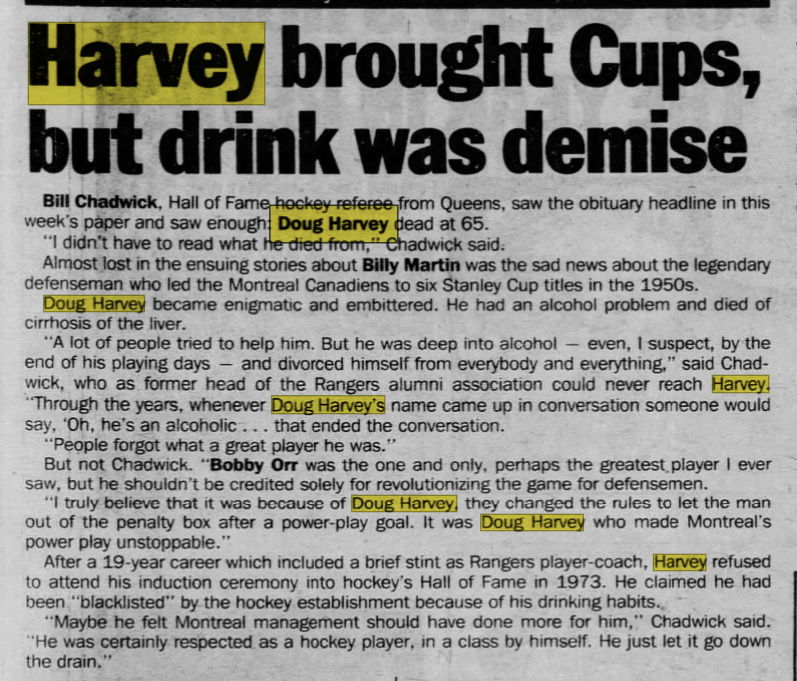
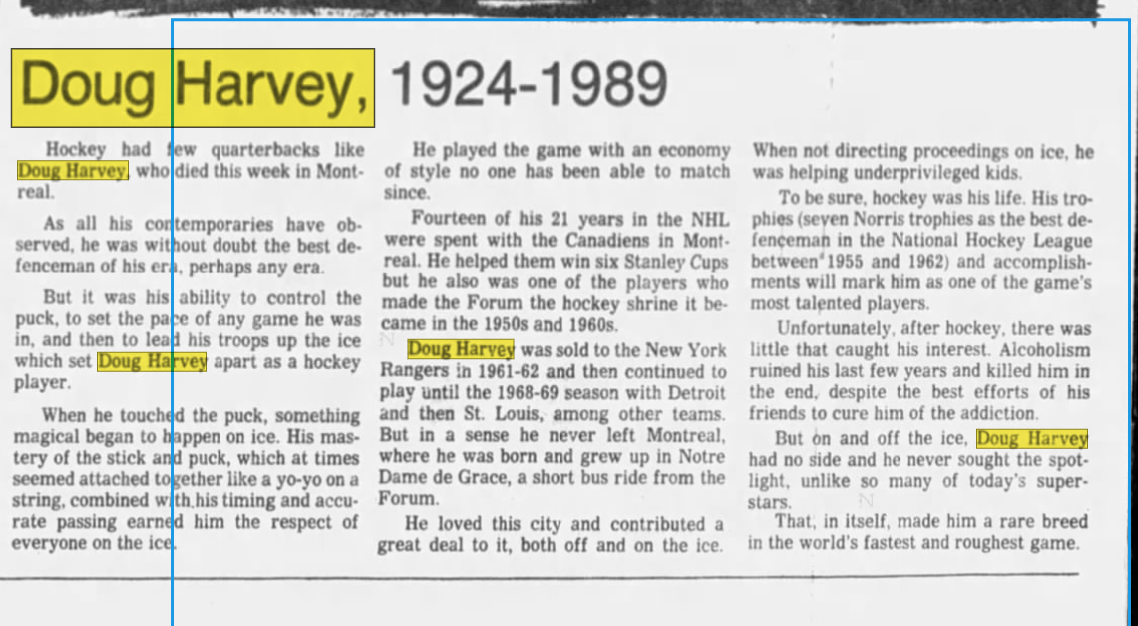

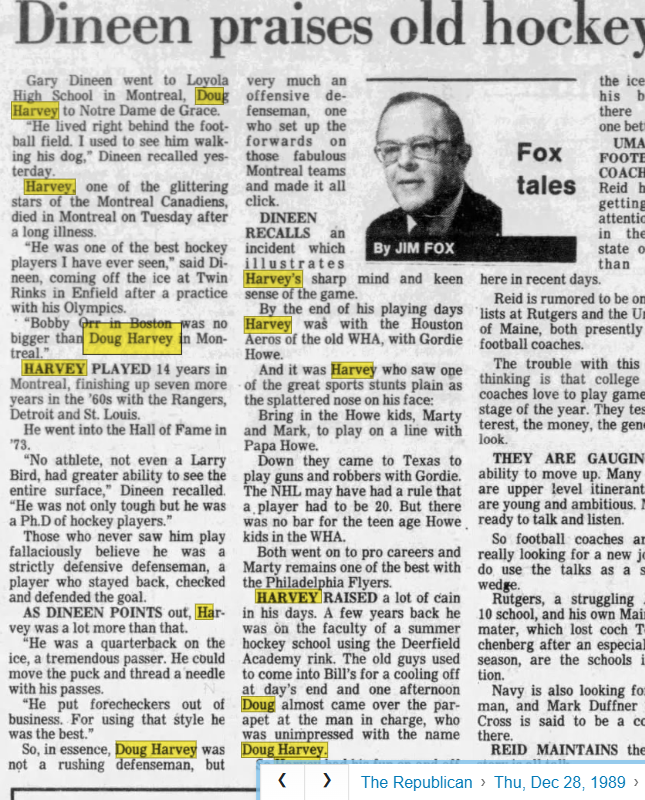
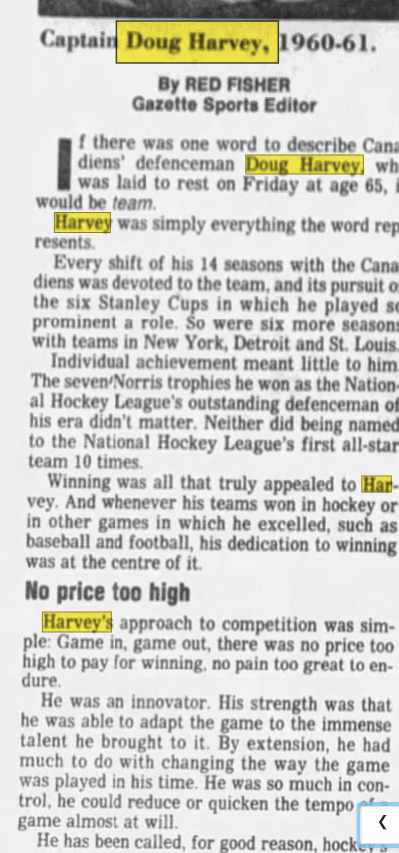
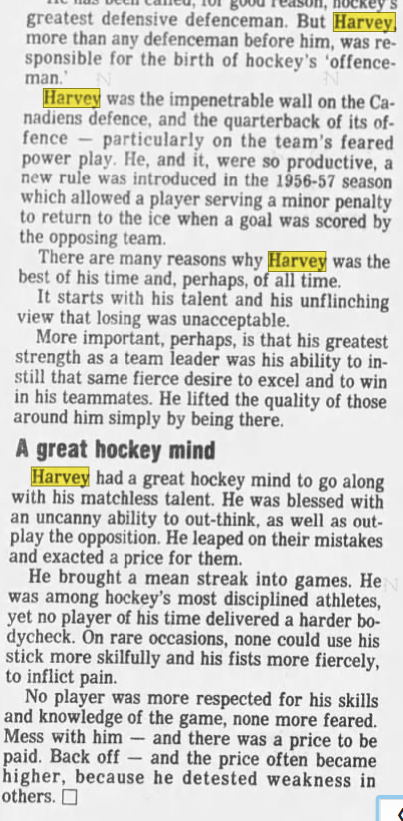
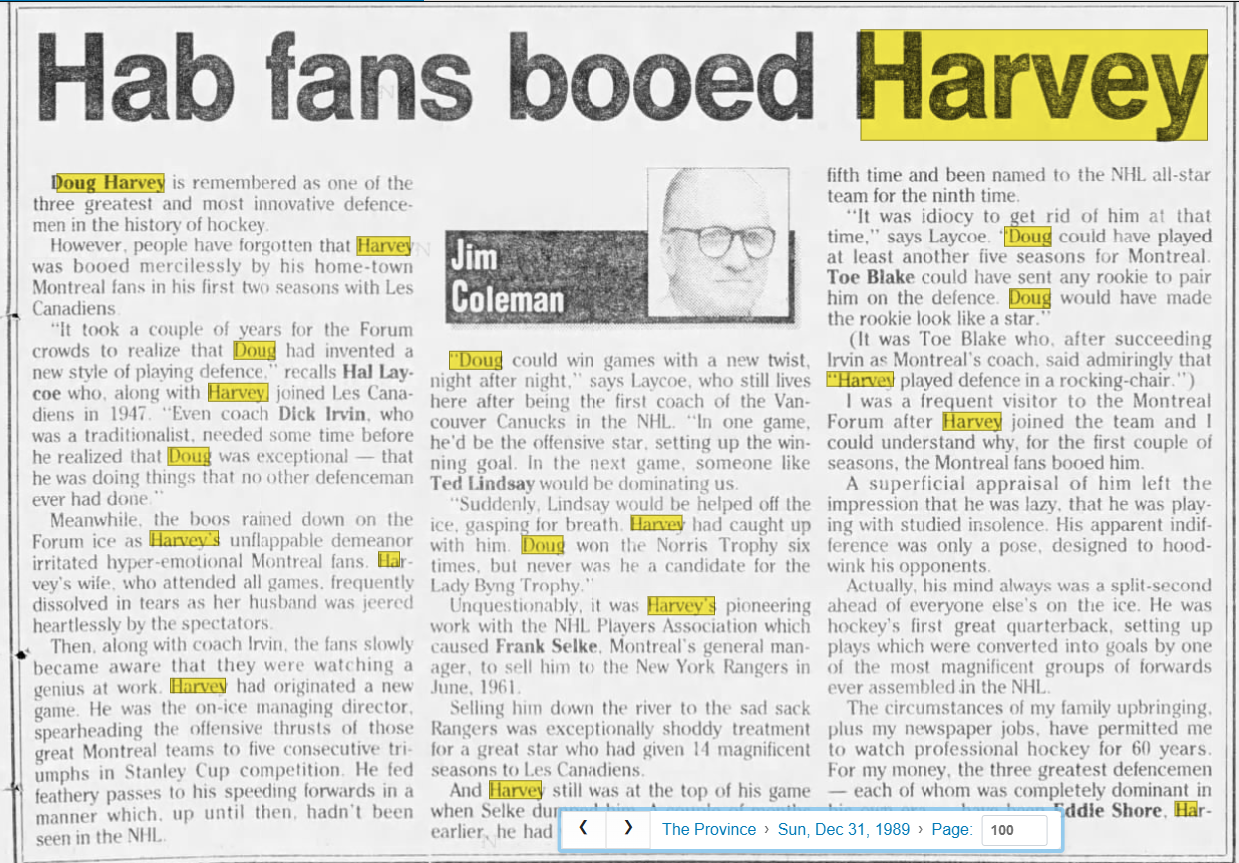
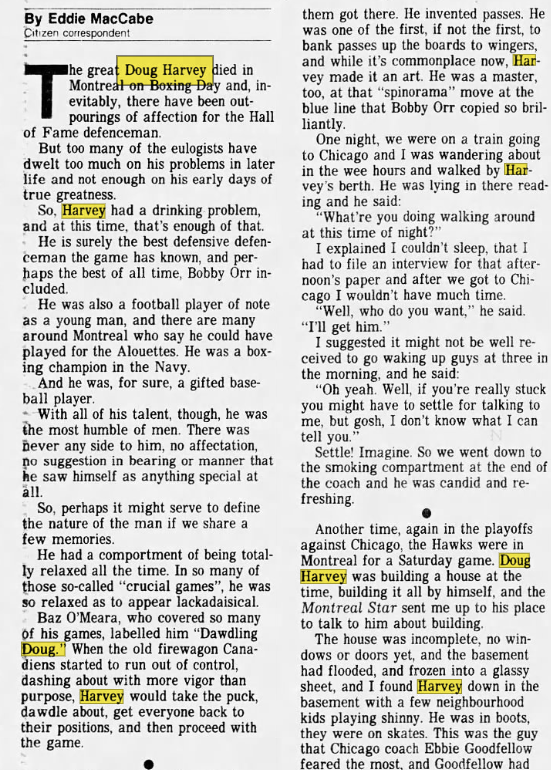
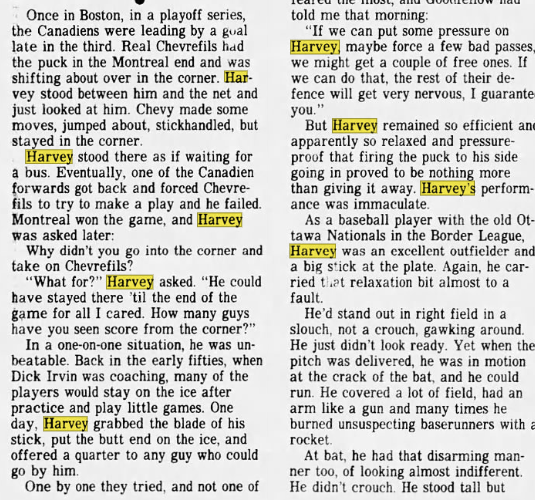
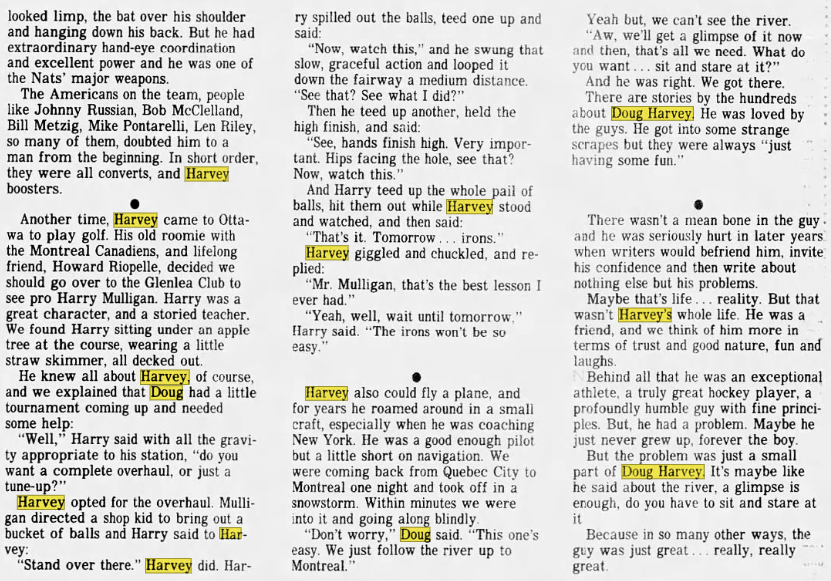
In the last installment of the top 100 project, I had Harvey as the greatest Habs player ever, ranked 6th (had Roy ranked 5th, but he played a large portion of his career with Colorado), 2 spots ahead of Beliveau in 8th. Nothing has changed in my estimation, and the deeper look into Harvey specifically only reinforces my position.
Earl Seibert is a perfectly solid #1 in a draft this size, but his standing in an all-time light, pales in comparison to Harvey. I had him ranked 51st all time and that's roughly about where he ends up on a lot of people's lists. You'll see about 10-12 defensemen in between Harvey and Seibert all time.
Seibert simply didn't control the game offensively, or defensively in the manner of Harvey.
Harvey, by a lot of the source material above, was the driving force and most important/influential player on the dominant Habs PP's. His playoff contributions and resume put him on the same tier as Beliveau as far as all-time great playoff performers go and while Beliveau is certainly more revered in Montreal, I'm not convinced he (or Richard) was a more integral part of the greatest dynasty in hockey history (50's Habs).
This is an extremely important beginning to a larger point.
Most of Windsor's playoff aces are contained within their top 6 F group. The entire 1st line. Zetterberg, to a lesser degree Fredrickson. I only see Lemaire standing out within the bottom 6 group of players.
Three Rivers spreads their playoff heroics out better, from the F group, to D, to Marty Brodeur. Taylor, Kucherov, Barry, Lemieux (and really the whole 4th line) give Three Rivers at least one playoff ringer on each F line.
There is no doubt that Windsor has a better collection of playoff F's.
But hockey isn't decided in one phase. Three Rivers was mindful to spread the wealth of experience and triumph, in crunch time, to other areas beyond F. Significantly so, I might add factoring in D, which we're talking about now, and G, which I'll get to tonight or tomorrow AM.
I hope I convinced the voters that the coaching match up favors Three Rivers. That's largely based on playoff accomplishments, best of 7, winner take all. Imlach simply got it done more often, and he largely built the teams he coached. I've pointed out, with evidence, that Imlach used assistants (coach in King Clancy, specifically) which paved the way for Bob Johnson to have a place, acting as the soother, in the same manner Clancy did.
Now you have a significantly more tested and proven defensive group led by Harvey and Lapointe.
12 Cup wins between them. Harvey played in 10 straight Cup finals, winning 6 between 1950-51 and 1959-60.
It doesn't end there.
Pulford and Patrick were mainstays in the Cup challenges between 1903 and 1909, the former being the captain of the famous Silver Seven dynasty in Ottawa and latter, winning back-to-back challenges with the Montreal Wanderers in 1906 and 1907, playing in 4 other finals beyond those 2.
Mike Grant, mentioned above, was captain of the Montreal Victorias dynasty in the 1890's. His team won or retained possession of the SC, 5 times between 1895 and 1899. It's widely accepted he was the best player on most of those teams.
And last but not least, Jack Marshall, won 5 Cup challenges during his career. His ability to play both D and C, gives us the flexibility to move he and Cyclone Taylor around in a pinch. He'd be familiar with Mike Grant and ties a bow on the strongest and most accomplished defensive corps in the draft IMO.
If Mark Howe was better than Lapointe, it wasn't by much and considering the rather large difference in playoff resumes (you'll see below), I'm comfortably calling it a wash, especially come SCF time.
Norris:
Lapointe - 2, 3, 4, 4, 5, 5
Howe - 2, 2, 2, 5, 6, 9, 10, 10
AS:
Lapointe - 1, 2, 2, 2, 6, 7
Howe - 1, 1, 1, 5, 6, 7, 7
Lapointe entered the league a few years after Bobby Orr. He had peer comp from a prime Orr, Potvin, Larry Robinson, Brad Park, Bjore Salming, Serge Savard, among others. This group surely is on par with what Howe went up against in the 80's, specifically the mid to latter portions of the decade when Howe was at his peak.
Lapointe played significantly on both ST units. I highlighted last series, just how much Bowman relied on Lapointe for both the PP And PK. He was a key figure on all 6 Cup teams he played on, as you'll see below.
Howe played in 2 SCF's and 1 CF.
1985 - SCF - Flyers are smoked 4-1 by Edmonton. Howe scores 2 points in 5 games and is a -1. Gretzky and Coffey each scored 11 points in 5 games.
1987 - SCF - Flyers take Edmonton to 7 games but Howe is subpar, scoring just 1 point in 7 games, while registering a -4 rating. Gretzky scored 11 points.
1989 - CF - Flyers lose 4-2. Howe scores 0 points in 6 games and is a +1.
In the deepest depths of the playoffs (Howe's teams made it out the 1st round those 3 times above), he scored 3 points in 18 games and was a -4.
Lapointe played in 5 SCF and 2 CF
1971 - SCF - Habs win Cup 4-3 over Chicago. Lapointe scores 3 points in 7 games and is even. He ties for team lead in points among D in series.
1973 - SCF - Habs win Cup 4-2 over Chicago. Lapointe scores 4 points in 6 games and is a robust +8, 2nd on the team. His 4 points are most among D.
1975 - CF - Habs shocked by Buffalo in 6 games. However, Lapointe is dominant, scoring 7 points in those 6 games, registering a +2. No other D scored more than 3 points. Robinson/Savard were abused in this series.
1976 - SCF - Habs sweep the Flyers, though Lapointe isn't anything to write home about, scoring 1 goal and ending up even. Bouchard and Robinson scored more.
1977 - SCF - Habs again sweep, this time Boston. Lapointe back to his dominant ways, registering 4 points in 4 games, and +5. He once again, scores the most points among D and his +5 tied Guy Lafleuer for best on team.
1978 - SCF - Habs win Cup 4-2, though it's finally the Robinson/Savard show, the former leading the team with 6 points and Savard 3. Lapointe had 2 in the 6 games and was a +1.
1979 - CF - Habs win 4-3 vs Boston. Lapointe would miss game 7 (and subsequently the Cup finals to follow) but once again, we see a stellar performance from Lapointe, scoring 5 points in 6 games and ending up a +4. Robinson had 6 points and was also a +4.
Add that all up:
7 series (6 SCF wins, 1 loss in CF)
39 games
26 points
+20
If you take out 1971 (since neither Savard or Robinson played that year)?
32 games
23 points
+20
Out of curiosity, let's put those figures up next to the other 2 members of the big 3.
Robinson:
1973 - 2 points - 6 games - +1
1975 - 3 points - 6 games - -2
1976 - 2 points - 4 games - +1
1977 - 3 points - 4 games - +3
1978 - 6 points - 6 games - +4
1979 - 6 points - 7 games - +4
6 series (5 SCF wins - 1 loss in CF)
33 games
22 points
+11
Savard:
1973 - 1 point - 6 games - even
1975 - 3 points - 6 games - -2
1976 - 0 points - 4 games - +4
1977 - 2 points - 4 games - +2
1978 - 3 points - 6 games - +5
1979 - 3 points - 7 games - +1
6 series (5 SCF wins - 1 loss in CF)
33 games
12 points
+10
*Robinson and Savard played in 6 of the 7 series w/Lapointe. Robinson hadn't yet cracked the NHL in 1971 and Savard was out w/a broken leg.
I think there was a reason why Bowman had Lapointe on the ice so much in the deepest parts of the tournament (Conference Finals and SCFs). He flat out showed up time and time again. His usage, as I showed in the last series, was higher than both Robinson and Savard due to the large chunk of time he spent on both ST units, while equaling his teammates at ES.
Even if you think Howe is the better player in an overall sense, I don't see a path towards there being any real gap, especially considering this is a best of 7 match up, Cup final.
2nd pairing - Pulford-Patrick vs Suter-Burns - Slight Advantage Three Rivers
I'm simply not as big a fan of Windsor's 2nd pairing as some might be. Regardless, I don't see Suter or Burns quote on Patrick or Pulford's level.
Suter had a short period of time where he was one of the 3-5 best Dmen in the sport (roughly 2012-14), but never really defined himself as the best. I certainly don't think that matches Lester Patrick or Harvey Pulford's reputation.
Norris record of 2, 4, 5, 8, 8, 9
AS record of 1, 5, 5, 6, 7, 9, 10
And my goodness, does his playoff record look abysmal.
44 points in 133 games and a -28 to cap it off.
10 of the 15 playoffs he's been a negative rated player. He never got out of the 2nd round in Nashville or Minnesota. Even the past 2 years, he's been nothing more than a depth veteran presence on Conference finalists Dallas, w/ 10 points in 38 games, -2.
Brent Burns peaked a bit higher, winning a Norris in 2017 (and finishing 4th in Hart voting), while being a finalist 2 other times (2016 and 2019). Beyond that though? Not a whole lot to write home about. Norris finishes of 8, 10, and 12.
He was a 3 time AS (1, 1, 2) but fades quickly after that, his next best finish being 8th and 10th (twice).
Norris record of 1, 2, 3, 8, 10, 12.
AS record of 1, 1, 2, 8, 10, 10, 12
He did have a Smythe worthy run in 2016 (SCF loss to Pitt) and another good jaunt in 2019. But beyond that, nothing to really get excited about.
Do either of those resumes look better than Patrick's below? I don't think so. Maybe you can get Burns there based on peak but Patrick also peaked as one of the best defensemen in the world and certainly held better longevity than Burns, as a top tier defender.
Stanley Cup Champion (1906, 1907)
Stanley Cup Finalist (1904, 1908, 1914, 1918, 1926)
First All-Star Team (1907) *ECAHA*
First All-Star Team (1913, 1915, 1916, 1917) *PCHA - DEFENSE*
Second Team All-Star (1918, 1920) *PCHA - DEFENSE*
Norris Trophy (1915) *PCHA - DEFENSE*
Team Captain (1907)
Stanley Cup Game Winning Goal (1906)
Canada Sports Hall of Fame (1975)
Inducted into the Hockey Hall of Fame (1947)
Pacific Coast Hockey Association [1911-1922] *DEFENSE*
Top-10 Scoring (5th, 5th, 9th, 10th)
Top-10 Goalscoring (2nd, 7th, 10th, 10th)
Top-10 Assist (3rd, 5th, 8th, 9th, 9th, 9th)
Top-10 Penalty Minutes (6th, 8th, 9th)
Top-10 Scoring Among defenseman (1st, 1st, 1st, 2nd, 2nd, 2nd, 3rd, 3rd, 6th, 6th)
Top-10 Goalscoring among defenseman (1st, 1st, 2nd, 2nd, 3rd, 3rd, 3rd, 4th, 5th, 7th)
Top-10 Assist among defenseman (1st, 1st, 2nd, 2nd, 2nd, 2nd, 2nd, 4th, 5th)
Top-10 Penalty Minutes among defenseman (1st, 2nd, 4th, 4th, 6th, 6th, 6th, 9th)
Top-10 Playoff Scoring (1st, 1st, 6th)
Top-10 Playoff Goalscoring (1st, 1st)
Top-10 Playoff Assist (3rd)
Top-10 Playoff Scoring Among defenseman (1st, 1st, 2nd)
Top-10 Playoff Goalscoring among defenseman (1st, 1st)
Top-10 Playoff Assist among defenseman (1st)
Procedure You will be presented with ~15 players based on their ranking in the Round 1 aggregate list Players will be listed in alphabetical order to avoid creating bias You will submit ten names in a ranked order, #1 through #10, without ties via PM to @seventieslord & @rmartin65 Use the same...

forums.hfboards.com
If you want a truly in depth look at Pulford and his reputation, click on the link just above this sentence.
He was the captain, for the full duration of the 2nd great dynasty in hockey history, with the Ottawa Senators winning 4 consecutive Cup challenges from 1903-1906.
His defensive reputation was sterling and towards the end of his career, became an effective rushing Dman. His checking struck fear into every opposing player. As far as defensive stoppers go on the blue line, I think Pulford easily takes the cake in an all time light, at least until Eddie Gerard was leading another Ottawa dynasty in the late 1910's/early 1920's.
It's more difficult to cross reference players from this era to those still playing today but Patrick and Pulford were both among the best D of their time, for a long period of time, in both cases.
As far as fit goes, I think both pairings work well from a stylistic standpoint, though Pulford-Patrick is a better defensive duo and certainly more accomplished, by a lot, in the playoffs, again a regular theme when looking at all 3 pairings.
I certainly don't think there is any significant gap between the 2nd pairings, it's hard to bet against Pulford-Patrick giving you more positive output given what's at stake and their experience under the brightest of lights.
3rd Pairing - Grant-Marshall vs Mohns-Goldham - Slight Advantage Three Rivers
Mike Grant was a certified superstar, captain of the first great hockey dynasty (1890's) and renowned for his offensive rushing and skating abilities. I don't think he was quite as consistent as his early era counterparts and teammates (Patrick and Pulford), but it's without dispute that he was very highly regarded and drew large crowds, while leading numerous teams, as captain, to titles.
I think he's easily the best player out of the 4, and coupled with a rugged, defensive minded, and equally battled tested Jack Marshall, gives Three Rivers another edge, this time on the bottom pairing.
Neither Mohns or Goldham were considered superstars, let alone stars. There is a singular 2nd team AS nod between the 2 of them, though Goldham was a key depth piece on the Detroit title teams of the 50's but he generally gets over drafted most years. This is a perfectly acceptable bottom duo in a draft of this size, but it doesn't have a Mike Grant level player.
Here are some quotes about Grant's abilities and reputation as a mega star:
Legends of Hockey:
Mike Grant was the premier defensive specialist of 1890s ice hockey, playing the ancient position of cover-point primarily for the Montreal Victorias of the Amateur Hockey Association of Canada and the Canadian Amateur Hockey League.
A very strong case can be made that Mike Grant was hockey's first true star; he was the first player to actually draw crowds that would sell out ice rinks all over Eastern Canada. He was also the first hockey player that newspaper reporters consistently reported on which helped popularize the game via the press.
Grant, already an accomplished speed-skating champion, played his first hockey with the Young Crystals, the junior team to the Montreal Crystals, and was named Captain within a year. He led the Young Crystals to the championship and then its intermediate squad to two more titles. The Montreal Victorias took note of this rising young star and signed him to a contract in 1893. In his third season with the Victorias, Grant captained his team to the first of four consecutive Stanley Cup championships.
He was a tremendous leader of men, played a fine brand of defensive hockey, was most likely the quickest skater in the game, and he was the finest puck-rusher of early hockey by practically all accounts. In fact, it may have been Grant who influenced later puck-rushers like Art Ross and Lester Patrick to master this art. It is safe to assume that if a Norris Trophy was awarded back in Grant's era he would have earned perhaps four or five as he was the premier dominant defensive player of his time. Similarly, it could be easily argued that Grant would have won at least one Hart Trophy and maybe even a Conn Smythe Trophy had there been such awards.
The Montreal Star said:
Eastern Canada probably does not contain a better hockey player than Captain Michael Grant. Captain Grant was born in 1874, stands 5 ft. 10 in. in height, and tips the scales at 170
The Winnipeg Tribune said:
Captain Grant is undoubtedly a tower of strength to his team. His keener critics said that last year was an "off" year with him, but, whether that be so or not his work this season has been fully up to his old standard. He has body enough and pluck enough to stop any rush and is himself quick to take the aggressive when the occasion offers. As a captain he has few superiors for he is cool, even to a fault, and knowing his men thoroughly he is well aware of their capabilities at all times
Talking about his highly regarded leadership.
Coming to personal mention, the name of Captain Mike Grant naturally suggests itself first. He has the rare qualities to make him at once a good player and a good captain. With a temper absolutely above the petty trivialities incidental to hockey, with a frame proof to the assault of the swiftest forward, with a judgment never more sure than when required on the instant and possessing as he did the perfect confidence of his team, Captain Grant proved himself a captain among captains.
http://news.google.com/newspapers?n...Q0uAAAAIBAJ&sjid=UTkDAAAAIBAJ&pg=1680,6299396
Even in 1905, Grant was still considered a superstar. Really neat piece giving an insight to how Grant viewed defensive work, tactically speaking.
"Mike Grant, the best known hockey player in Canada, captain for years of the erstwhile invincible Victorias, in speaking of general defense work says:"
There you have it.
Three Rivers, to me, is ahead across the board, not only in terms of talent and regular season bullet points, but playoff acclaim, and that's huge given we're in a Cup final.
You can clearly see the dominance of Harvey, the absolute brilliance of Lapointe in Conference Finals and SCF's. Patrick and Pulford went through the ringer and came out on top, as champions, numerous times. Same story with Grant and Marshall.
You have a wealth of leadership in this group, an unnatural calm, borne out of having such extensive big game experiences. I surely don't see that with players like Howe and Suter in the top 4.
Whatever advantage Windsor has among the F group (top 6 specifically) is erased when comparing the 12 men above and I think the series ultimately tilts our way when we get to G and special teams, analysis which I hope to have complete sometime tomorrow.

